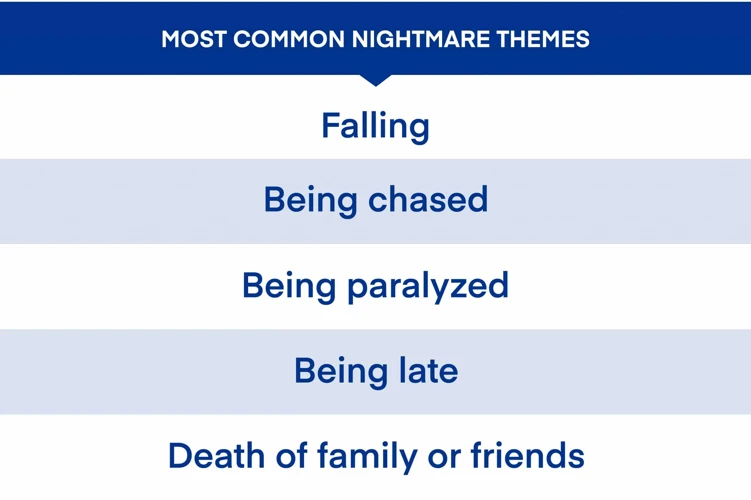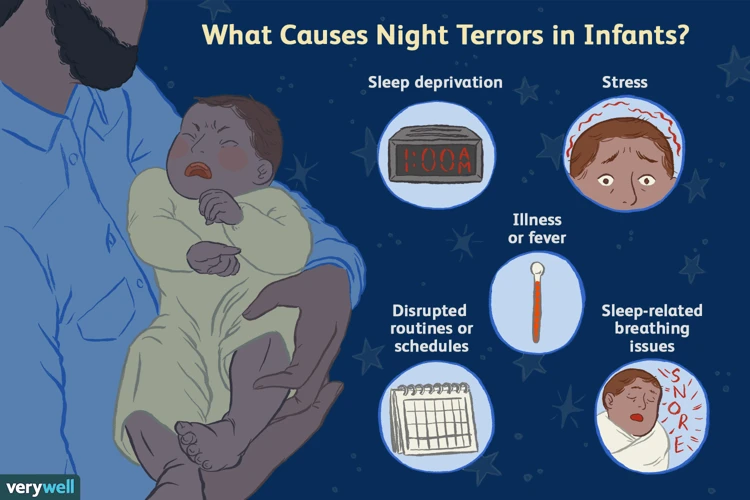For many of us, a good night’s sleep is essential to maintain physical and mental well-being. However, at times, we may experience nightmares that leave us feeling restless, anxious, and unable to function properly. Nightmares are not only a disturbing experience, but they can also have severe consequences on our sleep quality, which, in turn, can impact our daily life. If you’re struggling to manage nightmares, some tips can help you improve your sleep quality and overcome their impact on your well-being. In this article, we’ll explore the causes, symptoms, and effects of nightmares, and provide you with step-by-step guidance on how to improve your sleep and find relief from this distressing experience.
Understanding Nightmares

When we close our eyes to drift off into a deep slumber, the last thing any of us would want to encounter is an unsettling and distressing dream. Unfortunately, nightmares are a common occurrence for many people and can leave us feeling anxious and uneasy upon waking up. Understanding the causes and symptoms of nightmares can help us take proactive measures to mitigate their impact on our sleep quality. Let’s delve deeper into this topic.
Causes of Nightmares
Nightmares are vivid, frightening dreams that can leave people feeling disturbed and unsettled. They can be caused by a variety of different factors, including:
- Stress and Anxiety: High levels of stress and anxiety can contribute to nightmares. When we experience stress, our brains become overactive, leading to vivid dreams.
- Psychological Disorders: Certain psychological disorders, such as depression, anxiety, and PTSD, can also increase the likelihood of experiencing nightmares.
- Trauma: Traumatic experiences can cause nightmares, particularly if the trauma is related to violence or abuse.
- Substance Abuse: The use of drugs or alcohol can alter brain chemistry and lead to nightmares.
- Medications: Certain medications, such as antidepressants and beta blockers, can cause nightmares as a side effect.
- Eating Before Bed: Eating a large, heavy meal or consuming foods that are high in sugar or spice before bed can trigger nightmares.
- Sleep Deprivation: Not getting enough restful sleep can lead to nightmares.
It is important to identify the cause of the nightmares in order to properly address them and improve sleep quality. If you are consistently experiencing nightmares, it may be helpful to talk to a healthcare professional to determine the underlying cause.
Symptoms of Nightmares
Nightmares are vivid and disturbing dreams that can cause a number of negative physical and emotional symptoms. These symptoms can often be classified into three major categories: psychological, physical, and emotional. Below is a table illustrating some of the common symptoms associated with nightmares.
| Psychological Symptoms | Physical Symptoms | Emotional Symptoms |
|---|---|---|
| Anxiety: Feeling a sense of worry, apprehension, or unease | Sweating: Experiencing excessive sweating during sleep | Fear: A strong emotional response related to perceived danger, threat, or harm |
| Confusion: Feeling disoriented or puzzled | Trembling: Shaking or trembling while asleep or upon waking | Terror: An extreme and overwhelming feeling of fear |
| Mood Swings: Abrupt changes in emotional state | Increased Heart Rate: Rapid, pounding heartbeat | Helplessness: A sense of being powerless or unable to take action |
| Distress: Extreme discomfort and emotional suffering | Rapid Breathing: Quick, shallow breathing | Loss of Control: Feeling unable to control one’s thoughts, emotions or actions |
These symptoms can vary in intensity and frequency depending on the individual and the severity of the nightmare. If you are experiencing any of these symptoms and suspect that nightmares may be the cause, it is important to take steps to improve your sleep quality and seek professional help if necessary.
Effects of Nightmares on Sleep

Nightmares can have a significant impact on the quality of sleep. During a nightmare, a person may experience intense fear, anxiety, and even physical sensations. These emotions can cause an increase in heart rate and blood pressure, leading to a state of hyperarousal which can leave a person feeling exhausted and agitated.
Interrupted Sleep:
People who experience frequent nightmares may have their sleep interrupted, often waking up several times throughout the night. This can lead to daytime drowsiness and a lack of energy.
Increased Anxiety:
Nightmares can also lead to increased levels of anxiety, which can create a vicious cycle of worsening sleep quality. As someone continues to worry about having nightmares, it becomes harder to relax and fall asleep, and when they do eventually fall asleep the increased anxiety can make it more likely that they will have a nightmare.
Negative Emotional Effects:
Nightmares can also have negative emotional effects, leaving individuals feeling fearful and on edge. This can lead to difficulties with mood regulation and can create a cycle of negative thinking that can impact daily life.
Impaired Cognitive Functioning:
Sleep is crucial for optimal cognitive functioning and, when interrupted by nightmares, it can lead to difficulties with concentration, memory, and decision-making. This can have a profound impact on work or school performance, making it difficult to keep up with daily responsibilities.
Nightmares can have far-reaching effects on a person’s health and well-being, impacting everything from mood to cognitive function. It is important to take action to improve sleep quality and address nightmares in order to prevent serious health problems.
How to Improve Sleep Quality

Getting a good night’s sleep is essential for a healthy mind and body. However, for people experiencing nightmares, achieving deep, restful sleep is often a challenge. If you find yourself frequently waking up in the middle of the night feeling anxious, afraid or disturbed, it’s time to take action. Fortunately, there are a variety of strategies and techniques that can help you improve the quality of your sleep and alleviate the negative impact of nightmares. In this section, we will explore these methods in detail, so keep on reading.
Establish a Bedtime Routine
Having a consistent bedtime routine can significantly improve the quality of your sleep and reduce the likelihood of experiencing nightmares. Here are some tips for establishing a bedtime routine:
| 1. Stick to a regular schedule: | Try going to bed and waking up at the same time every day, even on weekends. This helps regulate your body’s internal clock and improve the overall quality of your sleep. |
| 2. Wind down before bed: | Engage in relaxing activities such as reading a book or taking a warm bath, to help your body and mind unwind before bedtime. Avoid stimulating activities such as watching TV or using your phone. |
| 3. Create a comfortable sleep environment: | Set the temperature to a comfortable level and ensure that your bedding and mattress are comfortable. Use blackout curtains, earplugs or a white noise machine, to reduce noise and light disruptions. |
| 4. Limit food and drink: | Avoid heavy meals, caffeine, nicotine and alcohol close to bedtime, as these can interfere with your sleep patterns and increase the likelihood of experiencing nightmares. |
| 5. Practice relaxation techniques: | Taking some time to practice relaxation techniques such as deep breathing or meditation, can help reduce stress and anxiety, which are common triggers of nightmares. |
By establishing a consistent bedtime routine, you can train your body and mind to associate these habits with sleep, leading to more restful and peaceful nights.
Avoid Stimulants Before Bed
It’s important to avoid consuming stimulants before bedtime in order to improve the quality of your sleep and reduce the likelihood of experiencing nightmares. Stimulants can include caffeine, nicotine, and alcohol. Here are some tips to avoid consuming stimulants before bed:
- Avoid caffeinated beverages: drinking coffee, tea, or cola before bed can make it harder to fall asleep and may cause more frequent awakenings during the night.
- Avoid nicotine: smoking cigarettes or using other tobacco products before bed can interfere with your body’s natural sleep cycle, leading to more frequent awakenings and reduced sleep quality.
- Avoid alcoholic beverages: although alcohol may initially help you feel sleepy, it can disrupt your sleep cycle and lead to frequent awakenings during the night.
- Avoid heavy meals: eating large or heavy meals before bed can make it difficult to fall asleep and may also cause indigestion or reflux, leading to discomfort and further disruption of your sleep cycle.
- Avoid screen time: the blue light emitted by electronic devices can interfere with the production of melatonin, a hormone that regulates sleep, making it harder to fall asleep and reducing sleep quality.
By avoiding these types of stimulants before bed, you can help your body get the restorative and restful sleep it needs to function at its best.
Relaxation Techniques
One effective way to improve sleep quality and reduce the frequency of nightmares is through the use of relaxation techniques. These techniques aim to reduce stress and tension in the body, allowing for a more peaceful and restful sleep. Here are some relaxation techniques that you can try:
| Technique | Description |
|---|---|
| Deep breathing exercises | This technique involves taking slow, deep breaths through your nose, holding the breath for a few seconds, and then exhaling slowly through your mouth. This can help to slow down your heart rate and reduce feelings of anxiety. |
| Progressive muscle relaxation | This technique involves tensing and then relaxing different muscle groups in your body, starting at your toes and working your way up to your head. It can help to release tension and promote a sense of calm. |
| Visualization | This technique involves imagining a peaceful and relaxing scene, such as a beach or a forest. Focus on the sensory details, such as the sound of the waves or the smell of the trees, and try to imagine yourself in that environment. |
| Meditation | This technique involves focusing your attention on a word, phrase, or object in order to calm your mind and reduce stress. You can do this by sitting quietly, closing your eyes, and repeating a calming word or phrase to yourself. |
By incorporating these relaxation techniques into your bedtime routine, you can create a peaceful environment that promotes restful sleep and reduces the likelihood of nightmares.
Natural Remedies for Nightmares

For those who prefer to avoid medication, natural remedies may offer a gentler solution to managing nightmares. From aromatherapy to herbal teas , these remedies have been used for centuries to promote relaxation and a better night’s sleep. While they may not work for everyone, they are definitely worth considering as part of a holistic approach to improving overall sleep quality.
Aromatherapy
Aromatherapy is a wonderful natural remedy that can help reduce the frequency and intensity of nightmares. This therapeutic practice involves using essential oils to promote relaxation and calmness, which can help you get a peaceful and restful sleep.
There is a wide range of essential oils that have been found to be effective in reducing anxiety and promoting sleep, including:
| Essential Oil | Benefits |
|---|---|
| Lavender oil | calming properties, relieves anxiety and depression |
| Chamomile oil | sweet aroma, relaxing, soothing, helps insomnia |
| Neroli oil | sedative properties, relieves tension, enhances relaxation |
| Ylang ylang oil | promotes relaxation, reduces stress and anxiety |
| Sandalwood oil | promotes relaxation, induces sleep, reduces anxiety |
To use essential oils for aromatherapy, you can add a few drops to a diffuser or humidifier and let the fragrance fill the room. Alternatively, you can put a few drops onto a cloth, tissue, or cotton ball and inhale the aroma directly.
It is important to note that essential oils are highly concentrated and should be used with caution. Do not apply undiluted essential oils directly to your skin or ingest them orally. Always dilute essential oils with a carrier oil such as coconut oil or almond oil before applying them to your skin or using them for aromatherapy.
Incorporating aromatherapy into your bedtime routine can help create a relaxing and peaceful environment, which can reduce the chances of experiencing nightmares and improve your overall sleep quality.
Herbal Teas
Many people have found relief from nightmares by drinking calming herbal teas before bed. The following are some popular herbs that can be made into tea:
- Chamomile: Chamomile tea is a popular choice for promoting relaxation and reducing anxiety. It may also have mild sedative effects, making it a good choice for promoting sleep.
- Lavender: Lavender is well-known for its calming and soothing effects. Drinking lavender tea before bed may help reduce anxiety and promote quality sleep.
- Valerian: Valerian root has been used for centuries as a natural sleep aid. Drinking valerian tea may help promote relaxation and alleviate anxiety, which can lead to fewer nightmares.
- Passionflower: Passionflower is a flower that has been traditionally used as a natural remedy for anxiety and insomnia. Drinking passionflower tea may help reduce stress and promote quality sleep.
- Lemon balm: Lemon balm is an herb that is commonly used for calming nerves and promoting relaxation. Drinking lemon balm tea before bed may help reduce anxiety and improve sleep quality.
It’s important to note that while herbal teas are generally safe, it’s always best to consult with a healthcare provider before trying any new herbal remedies, especially if you are taking medications or have a preexisting medical condition. Some herbs can interact with medications, so it’s important to ensure that the herbs you choose are safe for you to use.
When to Seek Professional Help
If you’ve been struggling with nightmares and they’re beginning to interfere with your daily life, it may be time to consider seeking professional help. While some people may find relief through self-help techniques, others may require additional support to address the root cause of their nightmares. It can be difficult to determine when it’s time to seek help, and it’s important to take into account the severity and frequency of your nightmares as well as any associated symptoms. Here are some signs that it may be time to reach out for guidance from a mental health professional.
Therapy
One effective approach to managing nightmares is therapy. Several types of therapy can help individuals cope with the underlying causes of nightmares.
Cognitive Behavioral Therapy: This type of therapy can help individuals identify negative thought patterns and replace them with positive ones. A therapist will work with the individual to develop coping mechanisms for dealing with their nightmares.
Exposure Therapy: Exposure therapy involves gradually exposing the individual to the source of their nightmares in a safe and controlled environment. The goal is to desensitize the individual to their triggers and reduce the frequency and intensity of their nightmares.
Eye Movement Desensitization and Reprocessing (EMDR): This therapy involves focusing on specific aspects of the nightmare while following a light or other stimuli that moves back and forth. The goal is to help the individual process the traumatic event and reduce the intensity of the nightmare.
Lucid Dreaming Therapy: This therapy involves learning to recognize when you are dreaming and taking control of the dream. Through lucid dreaming, the individual can confront and overcome the source of their nightmares.
It is important to work with a licensed therapist to find the type of therapy that works best for you. With the guidance and support of a therapist, you can learn to manage your nightmares and improve your sleep quality.
Medication
When it comes to medication for nightmares, it’s important to remember that it should always be a last resort and only used under the guidance of a medical professional. There are a few different types of medication that may be prescribed for nightmares.
1. Anti-anxiety medication: This type of medication can help alleviate anxiety symptoms that may be contributing to the occurrence of nightmares. These medications work by slowing down the central nervous system and promoting relaxation.
2. Antidepressants: While primarily used to treat depression, some antidepressants may also be effective in reducing the frequency and intensity of nightmares. This is because some antidepressants affect the levels of neurotransmitters in the brain that are associated with mood and sleep.
3. Blood pressure medication: Certain blood pressure medications have been found to reduce the occurrence of nightmares by regulating the amount of adrenaline released in the body during sleep.
| Medication Type | How it Helps | Possible Side Effects |
|---|---|---|
| Anti-anxiety medication | Alleviates anxiety symptoms contributing to nightmares | Drowsiness, dry mouth, dizziness |
| Antidepressants | Regulate neurotransmitters associated with mood and sleep | Nausea, weight gain, sexual dysfunction |
| Blood pressure medication | Regulates adrenaline released during sleep | Dizziness, fatigue, constipation |
It’s important to note that medication should never be the sole solution for managing nightmares. It’s important to also incorporate other techniques, such as relaxation exercises and therapy, as part of a comprehensive treatment plan. Additionally, individuals taking medication for nightmares should communicate regularly with their doctor to ensure proper dosage and to monitor for any potential side effects.
Conclusion
In conclusion, managing nightmares and improving sleep quality are crucial for maintaining good physical and mental health. Nightmares can have a severe impact on an individual’s quality of life, causing exhaustion, anxiety, and stress. However, by understanding the causes and symptoms of nightmares, individuals can take steps to prevent them. Establishing a bedtime routine, avoiding stimulants before bed, and practicing relaxation techniques can all help improve sleep quality and reduce the likelihood of nightmares.
Additionally, natural remedies such as aromatherapy and herbal teas can be fantastic and cost-effective options to alleviate nightmares. These remedies can be used in conjunction with proven techniques to improve sleep quality, such as avoiding daytime naps, creating a comfortable sleep environment, and maintaining a consistent sleep schedule.
It is important to note that if an individual’s nightmares persist despite practicing these techniques, seeking professional help may be necessary. Therapies such as cognitive-behavioral therapy (CBT) and medication can be helpful in addressing the underlying causes of nightmares and restoring restful sleep.
Overall, improving sleep quality requires consistent effort and commitment, but the benefits are well worth it. By taking steps to manage nightmares, individuals can improve their overall well-being and quality of life.
Frequently Asked Questions
What are some common causes of nightmares?
Common causes of nightmares include stress, anxiety, trauma, medication, and sleep disorders.
How often is it normal to have nightmares?
Having occasional nightmares is normal. However, if nightmares occur frequently and interfere with your daily life, it is worth seeking help.
Can nightmares be treated without medication?
Yes, there are various non-medication treatments that can help manage nightmares, including therapy, relaxation techniques, and lifestyle changes.
Is it helpful to talk about nightmares?
Talking about nightmares with a trusted friend or mental health professional can help you process your emotions and reduce the frequency and intensity of nightmares.
What role does diet play in reducing nightmares?
Eating a balanced and healthy diet can promote better sleep and reduce stress levels, which can in turn decrease the likelihood of experiencing nightmares.
What type of therapy is most effective for treating nightmares?
Cognitive-behavioral therapy (CBT) is the most commonly used therapy for treating nightmares. It involves identifying and changing negative thought patterns and behaviors that contribute to nightmares.
Can herbal remedies really help with nightmares?
While there is limited scientific evidence to support the use of herbal remedies for nightmares, some people find them to be helpful. It is important to speak with a healthcare provider before trying any herbal remedies.
How can I create a bedtime routine to reduce nightmares?
Creating a consistent bedtime routine that includes relaxation techniques such as meditation, reading, or taking a warm bath can help promote better sleep quality and reduce the occurrence of nightmares.
What types of medication are used to treat nightmares?
Medications such as antidepressants, anticonvulsants, and alpha blockers can be used to treat nightmares. However, these medications should only be taken under the guidance of a healthcare professional.
Are there any lifestyle changes that can help reduce nightmares?
Making lifestyle changes such as reducing stress, getting regular exercise, and avoiding alcohol and drugs can help reduce the frequency and intensity of nightmares.








